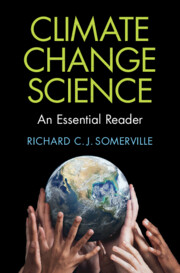Book contents
- Climate Change Science
- Reviews
- Climate Change Science
- Copyright page
- Dedication
- Epigraph
- Contents
- Preface
- Acknowledgments
- Part I Eight Articles from the Bulletin of the Atomic Scientists
- Part II Understanding and Communicating Climate Change Science
- Part III Scientific Investigations of the Climate System
- 13 The Greenhouse Effect
- 14 The Keeling Curve
- 15 The Temperature Record
- 16 Climate in the Future
- 17 Numerical Weather Prediction
- 18 Modeling the Climate System
- 19 Climate Feedbacks
- 20 Predictability
- 21 How Climate Models Work
- 22 The Sixth Assessment Report of the IPCC
- Part IV The Future
- Appendix: Curriculum Vitae of Richard C. J. Somerville
- Glossary
- Resources: Recommended Websites and Books
- References
- Index
20 - Predictability
from Part III - Scientific Investigations of the Climate System
Published online by Cambridge University Press: 13 November 2025
- Climate Change Science
- Reviews
- Climate Change Science
- Copyright page
- Dedication
- Epigraph
- Contents
- Preface
- Acknowledgments
- Part I Eight Articles from the Bulletin of the Atomic Scientists
- Part II Understanding and Communicating Climate Change Science
- Part III Scientific Investigations of the Climate System
- 13 The Greenhouse Effect
- 14 The Keeling Curve
- 15 The Temperature Record
- 16 Climate in the Future
- 17 Numerical Weather Prediction
- 18 Modeling the Climate System
- 19 Climate Feedbacks
- 20 Predictability
- 21 How Climate Models Work
- 22 The Sixth Assessment Report of the IPCC
- Part IV The Future
- Appendix: Curriculum Vitae of Richard C. J. Somerville
- Glossary
- Resources: Recommended Websites and Books
- References
- Index
Summary
For many important aspects of weather forecasts, predictive skill has improved by about one day per decade in recent years. A seven-day forecast now, for example, is approximately as accurate as a three-day forecast was four decades ago. Thus, progress in improving forecasts during about four decades has resulted in extending the useful forecast range by about four days. This is a remarkable accomplishment. However, any error in specifying the initial conditions, and we know errors are inevitable, will make the forecast go wrong after a certain time. As for our current forecasting skill, we can predict weather for at least several days. For the largest-scale features – very large weather systems, highs and lows on continental scales – the limit is thought to be a few weeks. Recent progress in research has led to major advances in our understanding of climate. These advances have greatly increased the confidence of scientists in their ability to make skillful and useful forecasts of how the climate system will respond to increased amounts of greenhouse gases in the atmosphere.
Information
- Type
- Chapter
- Information
- Climate Change ScienceAn Essential Reader, pp. 123 - 134Publisher: Cambridge University PressPrint publication year: 2025
Accessibility standard: WCAG 2.0 A
Why this information is here
This section outlines the accessibility features of this content - including support for screen readers, full keyboard navigation and high-contrast display options. This may not be relevant for you.Accessibility Information
Content Navigation
Allows you to navigate directly to chapters, sections, or non‐text items through a linked table of contents, reducing the need for extensive scrolling.
Provides an interactive index, letting you go straight to where a term or subject appears in the text without manual searching.
Reading Order & Textual Equivalents
You will encounter all content (including footnotes, captions, etc.) in a clear, sequential flow, making it easier to follow with assistive tools like screen readers.
You get concise descriptions (for images, charts, or media clips), ensuring you do not miss crucial information when visual or audio elements are not accessible.
Structural and Technical Features
You gain clarity from ARIA (Accessible Rich Internet Applications) roles and attributes, as they help assistive technologies interpret how each part of the content functions.
